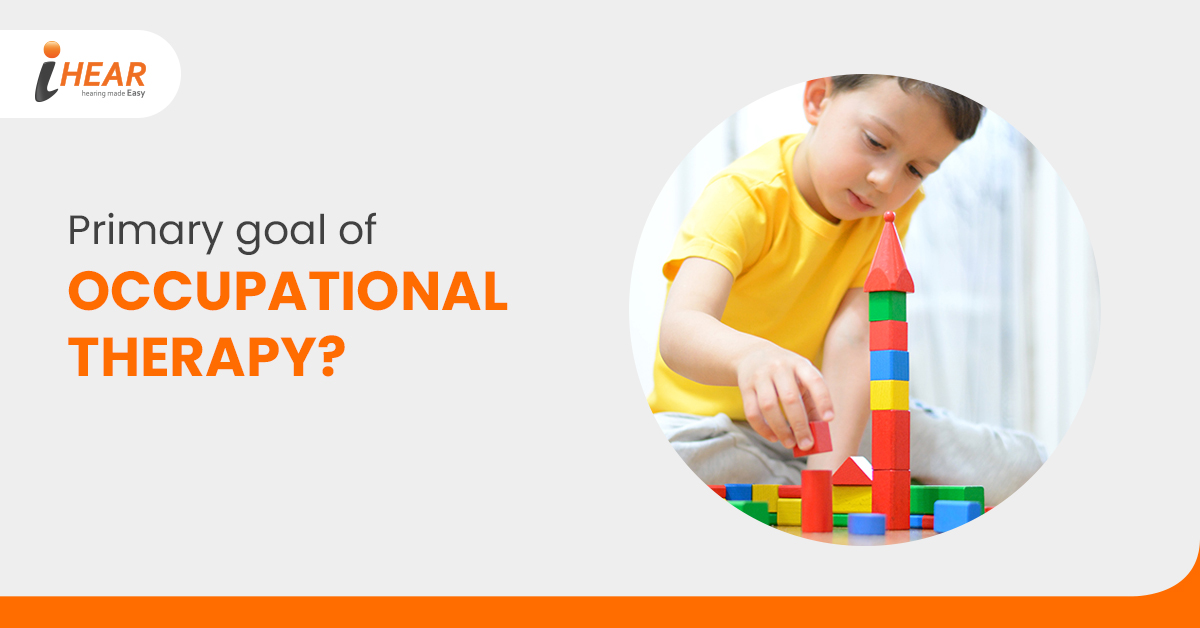Primary goal of occupational therapy-Hearing Aid Centre in Kolkata
What is the primary goal of occupational therapy?
Occupational therapy, as a multifaceted and client-centered healthcare profession, centers around the overarching goal of enabling individuals to participate fully in the activities of daily life. Rooted in a holistic approach to health and well-being, occupational therapy aims to enhance the functional capabilities of individuals across the lifespan, addressing challenges arising from physical, cognitive, emotional, or developmental factors. This dynamic and purpose-driven field places a profound emphasis on the concept of “occupations,” encompassing the broad spectrum of activities that occupy a person’s time and contribute to their sense of identity, purpose, and fulfillment.
At its core, the primary goal of occupational therapy is to foster independence and autonomy in individuals, empowering them to navigate the complexities of daily living with confidence and competence. This goal is pursued through a comprehensive assessment of an individual’s abilities, challenges, and environmental factors. Occupational therapists meticulously tailor interventions to meet the unique needs of each person, recognizing the diverse range of factors that influence their engagement in meaningful activities.
One of the fundamental aspects of occupational therapy involves enhancing overall function and participation. Whether an individual is recovering from an injury, managing a chronic condition, or facing developmental obstacles, occupational therapists employ evidence-based interventions to improve their clients’ ability to perform essential tasks. This includes activities of self-care, work-related responsibilities, and various leisure pursuits, all of which contribute to a person’s sense of purpose and well-being.
A key facet of occupational therapy is the promotion of health and well-being on a holistic level. Beyond addressing physical impairments, occupational therapists consider the psychological and emotional dimensions of their clients’ lives. By recognizing the interconnectedness of mind and body, therapists work collaboratively with individuals to develop strategies that not only enhance physical function but also contribute to mental and emotional wellness. This integrative approach aligns with the belief that true well-being is achieved when all aspects of an individual’s health are considered and nurtured.
Adaptation and innovation are hallmarks of occupational therapy. In instances where individuals face challenges due to disability or environmental barriers, occupational therapists play a pivotal role in facilitating adaptation. This may involve the prescription of assistive devices, recommending modifications to the environment, and implementing personalized strategies that enable clients to overcome barriers to participation. The goal is not merely to compensate for limitations but to empower individuals to actively engage in their desired activities and roles.
Prevention of disability is a proactive dimension of occupational therapy. By identifying and addressing issues early in their development, occupational therapists work to prevent further decline and minimize limitations. This preventive approach underscores the profession’s commitment to maximizing individuals’ potential and fostering resilience against the impact of health challenges.
Crucially, the primary goal of occupational therapy is achieved through a collaborative and client-centered process. Occupational therapists engage in a therapeutic partnership with their clients, recognizing the importance of understanding personal values, preferences, and aspirations. This collaboration empowers individuals to actively participate in decisions regarding their care, ensuring that interventions align with their goals and priorities.
Key aspects of the primary goal of occupational therapy include:
Enhancing Function and Independence: Occupational therapists strive to improve an individual’s ability to perform everyday activities, such as self-care tasks, work, and leisure activities. The goal is to maximize independence and participation in all aspects of life.
Promoting Health and Well-Being: Occupational therapy focuses on holistic health, addressing physical, mental, and emotional well-being. Therapists work to improve overall quality of life by considering the individual’s unique needs and goals.
Adapting to Challenges: Whether someone is recovering from an injury, managing a chronic condition, or facing developmental challenges, occupational therapists assist in adapting to these challenges. This may involve the use of assistive devices, environmental modifications, and personalized strategies.
Facilitating Participation: Occupational therapists emphasize meaningful engagement in activities that are important and personally relevant to the individual. This could include activities related to self-care, work, education, hobbies, and social interactions.
Preventing Disability: Occupational therapy is proactive in preventing and minimizing disability. Therapists work to address issues early on, providing interventions that promote optimal function and prevent further decline or limitations.
Collaborating with Clients: Occupational therapists collaborate with individuals, taking into account their values, preferences, and goals. The therapeutic process is client-centered, empowering individuals to actively participate in decisions regarding their care.
The primary goal of occupational therapy is a nuanced and multifaceted pursuit aimed at enriching the lives of individuals by enabling their participation in meaningful activities. Whether through the enhancement of functional abilities, the promotion of holistic health, the facilitation of adaptation, or the prevention of disability, occupational therapy stands as a dynamic profession dedicated to empowering individuals to lead fulfilling and meaningful lives.
VISIT: iHear is a state of the art brand of Speech and hearing aid Center in Kolkata, West Bengal, spreading light across the nation. Our skilled professionals provide heartfelt services to patients with speech, hearing, and balance impairment in a great way. We aspire to broaden our horizons throughout the entire nation and put an end to human suffering, by improving the quality of life of people with speech and hearing impairment.

